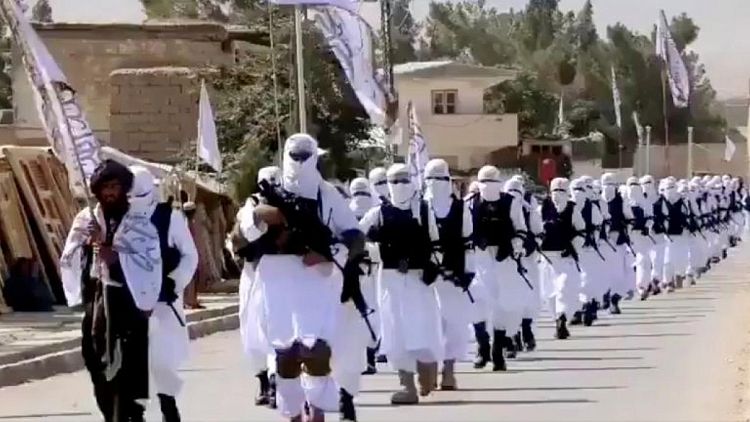By Idrees Ali, Humeyra Pamuk and Jonathan Landay
WASHINGTON - With no U.S. troops or reliable partners left, jails emptied of militants and the Taliban in control, doubts are mounting within President Joe Biden's administration over Washington's ability to stem a resurgence of al Qaeda and other extremists in Afghanistan, six current and former U.S. officials told Reuters.
Afghan security forces whom the United States helped train crumbled as Taliban militants made their way through Afghanistan in less than two weeks, leaving the United States with few partners on the ground.
"We're not in a good place," said a U.S. defense official, who requested anonymity to discuss the issue.
Weeks before the 20th anniversary of the Sept. 11, 2001, attacks on the United States by al Qaeda, the lack of visibility regarding potential extremist threats is a chilling prospect for officials.
U.S.-led forces toppled the Taliban in 2001 for sheltering al Qaeda militants, leading to America's longest war.
The U.S. troop departure ordered for Aug. 31 by Biden and the subsequent collapse of Afghan security forces have stripped the CIA and other spy agencies of protection, forcing them to close bases and withdraw personnel as well.
The Biden administration cannot rely on neighboring countries because it has so far been unable to strike accords on bases for U.S. counterterrorism forces and drones, officials said.
That has left Washington dependent on staging counterterrorism operations from U.S. bases in the Gulf and counting on the Taliban to adhere to the 2020 U.S. pullout deal to stop militant attacks on the United States and allies.
But it is a costly endeavor. Flying military aircraft out of the Middle East, the nearest military hub Washington has in the region, may ultimately cost more than the 2,500 troops that had been in Afghanistan until earlier this year, the officials added.
Even deploying scarce U.S. resources to monitor militants in Afghanistan will effectively have to compete with the administration's key priority in Asia of countering China.
The Group of Seven industrialized nations made it a priority that Afghanistan's new Taliban rulers break all ties with terrorist organizations and that the Taliban must engage in the fight against terrorism, an official at the French presidency said on Tuesday after a meeting of G7 leaders.
'SEVERE DISADVANTAGE'
U.S. military leaders estimated in June that groups like al Qaeda could pose a threat from Afghanistan to the U.S. homeland in two years.
But the Taliban takeover rendered that estimate obsolete, officials said.
Nathan Sales, the State Department's coordinator for counterterrorism until January, estimated it would now take al Qaeda six months to reconstitute the ability to conduct external operations.
The Taliban freed hundreds of detainees from prisons, stirring fears that some may include leading extremists.
While the Taliban vowed to uphold their commitment to prevent al Qaeda from plotting international attacks from Afghanistan, experts questioned that pledge.
Daniel Hoffman, a former chief of CIA covert Middle East operations, expressed doubt that the Taliban would constrain al Qaeda, noting their decades-old ties and shared ideologies.
"The country is a petri dish of threats: ISIS, al Qaeda and the Taliban. They all have us in their crosshairs," he said.
Biden has said the United States will closely monitor militant groups in Afghanistan and has the ability to track and neutralize rising threats.
But he wrongly said last week that al Qaeda was "gone" from the country, confusing U.S. officials.
His national security adviser, Jake Sullivan, said on Monday that Biden was referring to al Qaeda's capability to attack the United States from Afghanistan.
A series of United Nations reports say that hundreds of al Qaeda fighters and senior leaders remain in Afghanistan under Taliban protection.
U.S. military planners say some intelligence can be gathered by satellites and aircraft flying from bases in Qatar and the United Arab Emirates. But they acknowledge such operations are expensive.
"Our intelligence community and our military operators are going to be at a severe disadvantage in trying to identify where these al Qaeda cells are located, what they're planning, and it's going to be incredibly difficult for us to take them off the battlefield," said Sales.
In 2015, U.S. military officials were surprised to learn that al Qaeda was operating a massive training camp in the southern Kandahar province. That was with thousands of U.S. and coalition troops in Afghanistan.
"Even when we had forces on the ground and a very robust air coverage, we would often be surprised by what al Qaeda was able to do," said Kathryn Wheelbarger, a former senior Pentagon official.
Pakistan has said it will not host U.S. troops and countries in central Asia are reluctant to accept American requests because of concerns that it may anger Russia.
"I just do not believe over-the horizon can work, particularly in Afghanistan," Wheelbarger said, referring to counterterrorism efforts from outside Afghanistan.
